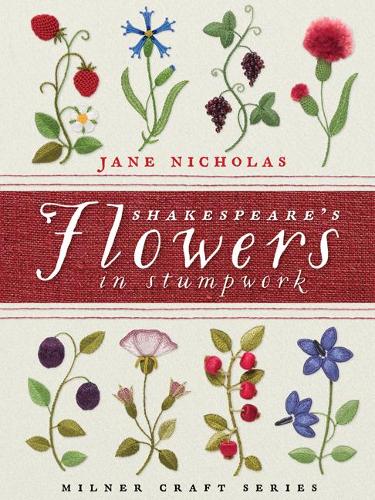
Shakespeare's Flowers in Stumpwork
(Hardback)
Publishing Details
Shakespeare's Flowers in Stumpwork
By (Author) Jane Nicholas
Sally Milner Publishing Pty Ltd
Sally Milner Publishing Pty Ltd
1st July 2015
Australia
Classifications
General
Non Fiction
746.44
Physical Properties
Hardback
272
Width 210mm, Height 280mm
1168g
Description
This embroidered border was inspired by the painted border of a letter written by Lady Anne Clifford to her father in 1598 the time of Elizabeth I and Shakespeare. Worked on ivory silk satin, in stumpwork and surface embroidery, this design features fourteen assorted flowers and fruits popular at the time, including the Apothecary rose, Sweet briar and Heartsease, Barberries, Bellflower, Borage and Periwinkle, Cornflower, Gillyflower and Knapweed, and Grapes, Plums, Redcurrants and Strawberries. As in the original letter, the panel is outlined with pairs of fine red lines these have been worked in back stitch. This border may be used to surround a mirror, or to enclose a special photograph, a monogram, a precious memento, or perhaps a tiny stumpwork figure.
Reviews
October 2015
The beautifully painted border of a letter written by Lady Anne Clifford to her father in 1598; the time of Elizabeth I and Shakespeare inspired Jane Nicholas in the creation of her own stunning stumpwork and embroidery. The projects in this book showcase many of the flowers and fruits popular at the time, from the apothecary rose, to periwinkle and strawberries. Lavishly illustrated in colour, with detailed step-by-step instructions and quotes from the Bard himself, this stunning book will make a delightful edition to any bookshelf if anyone interested in textured and dimensional embroidery.
July 2015
The flowers featured in this book grew in Shakespeare's time. The chosen flowers are ones that most people will be familiar with. The work includes borders, samplers and single flowers. Detailed step-by-step instructions together with every possible detail, make this book a must for stumpwork enthusiasts. This is also a lovely book just to look at. There are extracts from Shakespeare's work accompanied by beautiful illustrations, for example one of Redoute's roses. There is a short historical background too.
* Karen Platt Yarnsandfabrics.co.uk/crafts *If you love stumpwork embroidery, if you love flowers, and if you have a bit of a penchant for historical embroidery, literature, poetry then youll definitely want to know about Jane Nicholass new stumpwork book, Shakespeares Flowers in Stumpwork, which is due out soon, soon, soon!
Im so excited about this book! And on so many levels.
Stumpwork. Flowers. History. Literature. Poetry. Shakespeare. Im a sucker for all of the above.
But really, its Janes exquisite artistry with the needle that seals them all up into such an appealing package.
When daisies pied and violets blue
And lady-smocks all silver-white
And cuckoo-buds of yellow hue
Do paint the meadows with delight
Shakespeares poetry is jam-packed with references to flowers. The lines above from Loves Labours Lost are a favorite. Theyre so pretty, despite the rest of the song. Ive always wanted to illuminate them. Paint them. Stitch them. Or do something with them.
And Im so glad that Jane has done that with stumpwork.
(Especially because I have no idea what cuckoo-buds are. I think he made the name up he was prone to doing things like that.)
I havent seen the book yet Im waiting eagerly for it but I promise that as soon as its in my grimy little paws, Ill work up a detailed review for you.
Based on Janes other books, though (I have them all), I have no doubt this book will be exquisite.
The Contents of Shakespeares Flowers
Shakespeares Flowers in Stumpwork is divided into five sections. Here are the content details:
Part 1: A border of Shakespeares flowers, apothecary rose, barberries, bellflower, borage, cornflower, gillyflower, grapevine, heartsease, knapweed, periwinkle plum, redcurrants, strawberry, and sweet briar.
Part 2: Shakespeares Flowers: The Samplers
Sampler One: Sweet Briar, Grapevine, Heartsease and Strawberries
Sampler Two: Apothecary Rose, Borage, Cornflower and Redcurrants
Sampler Three: Gillyflower, Periwinkle, Plums and Barberries
Part 3: Elizabethan Flower Panel, bluebell, crab apple, honeysuckle, Lancaster rose, pea pod and primrose
Part 4: Garland of Spring Flowers, English daisy, Forget-me-nots, wild pansies and snowdrops
Part 5: Techniques, equipment, stitch glossary, framing up with hoops or frames, working with wire, materials and equipment
What Ive found with every one of Janes books is that theyre not just embroidery books.
Ok, they are embroidery books. But theyre So Much More!
Theyre works of art on their own. Theyre dream books. Theyre sources of inspiration. Theyre picture books, coffee table books, pleasure books. You can just flip them through and they make you happy!
Theyre also technically and precisely well written. But theyre not usually heavy on detailed, instructional images, so if youre new to stumpwork all around, you might start a little lighter, with some of the recommendations below.
Recommendations for Beginners
If you are an absolute beginner to stumpwork, Shakespeares Flowers, like several of Janes other books, might not be the place to start.
Dont get me wrong, though. If youre already pretty familiar with surface embroidery and comfortable with stitching in general, and youre a determined beginner in stumpwork, I think you can handle Janes books.
But if youre a beginner in embroidery in general and youve never done stumpwork, Id recommend Stumpwork Flowers by Sachiko Morimoto for your first foray into embroidering stumpwork flowers. The projects in that book are small, simple projects that will help you achieve good results.
Id also recommend investing in the RSN Essential Stitch Guide to Stumpwork, to use as a handy reference.
see full review at www.needlenthread.com
* needlenthread.com *Author Bio
Jane Nicholas has worked in the field of embroidery for over twenty years, specialising in stumpwork and goldwork embroidery. She has written five books and has contributed widely to journals and magazines. She teaches widely for Embroiderers' Guilds and businesses in Australia, New Zealand and the United States, and continues to research and develop new techniques, particularly in stumpwork.
